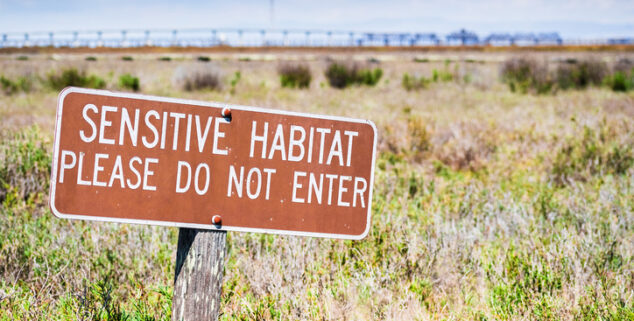Opinion
Let’s seize opportunity to fix CEQA
 "Sensitive Habitat; Please Do Not Enter" sign posted on the shoreline of San Francisco Bay; marsh vegetation visible in the background; Palo Alto, California. Image by Sundry Photography.
"Sensitive Habitat; Please Do Not Enter" sign posted on the shoreline of San Francisco Bay; marsh vegetation visible in the background; Palo Alto, California. Image by Sundry Photography.Capitol Weekly welcomes Opinions on California public policy or politics. Click here for more information about submitting an Op-Ed.
OPINION – Sacramento gets a bad rap for its slow bureaucracy. But when it comes to dismantling environmental protections, it can operate at lightning speed.
Early this summer a proposal to gut the California Environmental Quality Act was publicized on a Friday morning and by Monday Gov. Gavin Newsom signed it into law.
Behind closed doors, legislative leaders struck a deal to allow polluting manufacturing facilities and developments in endangered species habitat to skip thorough environmental reviews. Most Californians didn’t know about it. For others like me, who follow legislative news closely, there wasn’t time to fight Senate Bill 131.
Now lawmakers are back from recess with an opportunity to fix a bad bill. The price of inaction is staggering.
Under S.B. 131, advanced manufacturing facilities, such as those that make aerospace parts and recycle plastics, could be quickly built near communities without the scientific analysis needed to determine pollution, water safety and other environmental factors. Without this analysis, there’s no way to push industrial developers to use recycled water, install solar infrastructure or improve their projects in other ways.
Lawmakers have yet to explain why communities, including those already facing a heavy pollution burden, must give up their right to clean air and water.
That’s because this wasn’t a typical bill that goes through a transparent, deliberative process. This was a trailer bill tied to the state budget that left elected officials with few options other than to swallow the poison pill.
Since the law passed in 1970, lawmakers have poked holes in CEQA, enacting exemptions so more projects can bypass scrutiny. But S.B. 131 isn’t just contributing to a Swiss cheese effect, it’s ripping out the law’s heart. As a result, CEQA looks more like a doughnut, lacking the thorough environmental review requirement at its core.
Legislators should now pass a new trailer bill to fix at least two glaring mistakes. They should remove advanced manufacturing from the list of CEQA-exempt projects and add endangered and threatened species habitat to sites that require comprehensive study. This month more than 200 environmental justice, green and community groups urged the legislature to do just that.
This commonsense cleanup language doesn’t mean manufacturing operations can’t be built or that wildlife habitat is entirely off limits. It means that the developer must do some homework and prove their project isn’t risky or that they’re taking steps to minimize risks.
It’s the least we can ask of someone planning to pave over land where red-tailed hawks forage and mountain lions roam.
Newsom wants to make it easier to build. And while Californians might disagree about the details, we can all agree that we shouldn’t decimate our natural heritage and drive wildlife to extinction in the name of growth.
We learned this year that decades of work to protect endangered species can be quickly wiped out. President Trump is proposing to rescind nearly all habitat protections for imperiled wildlife, making it easier to log, drill and bulldoze in the places these animals need to survive.
In a political climate this hostile to the environment, California should be strengthening CEQA while addressing the housing shortfall with upzoning policies in the urban core and developer requirements that yield more affordable units. Instead S.B. 131 in its current form sadly shows a willingness to borrow from Trump’s anti-regulatory, anti-environment and anti-democratic playbook.
I’m a lifelong Californian who’s proud to live in a state that strikes a careful balance between conservation and an economy that ranks fifth in the world. I believe our lawmakers are dedicated to that balance and I’m depending on them to fix what might have been an oversight in the rush to pass the budget.
But if this is an intentional attack on our state’s landmark law and it’s proven successful, then California is an environmental leader no more. A state that offers a free pass for industrial developers and gives away endangered species habitat can’t claim to care about environmental quality.
Elizabeth Reid-Wainscoat is a campaigner at the Center for Biological Diversity, a nonprofit organization using science, law, and activism to protect endangered species and wild places
Want to see more stories like this? Sign up for The Roundup, the free daily newsletter about California politics from the editors of Capitol Weekly. Stay up to date on the news you need to know.
Sign up below, then look for a confirmation email in your inbox.

Leave a Reply